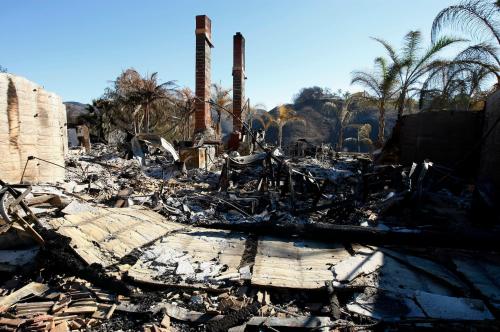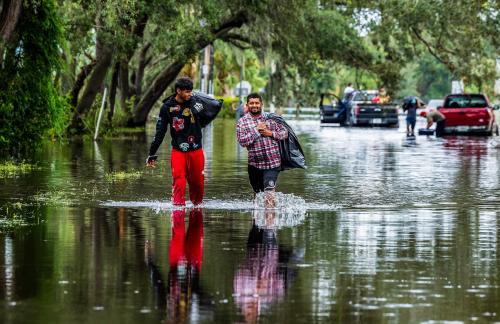This Brookings Center on Regulations and Markets – Fireside chat with Dante Disparte, founder and chair of Risk Cooperative, was recorded on November 10, 2020.
Sanjay Patnaik, director of the Center on Regulation and Markets and Bernard L. Schwartz Chair in Economic Policy Development in Economic Studies, recently sat down with Dante Disparte, the founder and chair of Risk Cooperative and a member of the National Advisory Council for the Federal Emergency Management Agency (FEMA). They discussed the roles of the private and public sector in managing systemic economic risks, especially the risk of climate change.
Watch the full conversation, and read highlights below:
How can companies respond to climate risk?
Evidence of the economic costs of climate change can be found in the increasing prevalence and costs of climate disasters, including hurricanes and wildfires. Yet according to Mr. Disparte, climate risk has been overshadowed by political risk and the COVID-19 pandemic in many advanced economies, and as a result has been left off most companies’ balance sheets. Because companies fail to account for climate risk, the private costs of climate disasters are often being passed along to the taxpayer via public sector intervention. Mr. Disparte argues that companies must recognize the risks that climate change poses to their business operations and hedge this risk accordingly through purchasing insurance and through refraining from locating investments in disaster-prone areas or in promoting better adaptation and resilience.
How can regulators and companies work together to address climate risk in the private sector?
Voluntary efforts by corporations to address climate risk are rare but growing. Over the past decade, investor concerns have driven many companies to make a deeper commitment to reporting on long-term, intangible climate risks. However, these efforts are not standardized. According to Mr. Disparte, regulators should intervene to create a standard set of climate risk disclosure requirements that can apply to a variety of industries. Mr. Disparte also highlights how regulators can step in to identify “double jeopardy” risks—where a company’s asset comes under pressure from multiple sources of risk—and to encourage investors to price such risks into financial models.
How can the federal government overhaul existing policy and prepare for an increasing number of extreme weather events?
The best way to prepare emergency response to handle an increasing number of disasters is to stop treating the emergency response as the “first line of defense” against climate events, says Mr. Disparte. Households, companies, and local governments must take action to mitigate their climate risk before a disaster occurs, instead of relying on last in line defense first for disaster relief. This entails critically thinking about rebuilding in disaster-prone areas, building structures that are resilient to climate disasters, and understanding the unique long-term economic risks that a “changed climate” poses to individual towns and regions. The COVID-19 pandemic has also illustrated the need for national emergency response to scale up its capacity for disaster intervention. Due to the pandemic, all 50 states declared a disaster simultaneously. In response, FEMA had to coordinate between the public and private sectors to ensure that all states had sufficient protective equipment. Emergency responders should learn from this experience and ensure that there is expanded capacity for coordinating between the public and private sectors.
How can we learn from the COVID-19 pandemic when considering how to address our climate risk?
Though many experts, including Mr. Disparte, predicted the devastation that a global pandemic could cause, much of the world avoided taking responsibility for this risk. Mr. Disparte argues that this same fallacy occurs with climate change. The global, systemic, and seemingly abstract nature of climate change has prevented many from taking action to address their own climate risk. Yet the COVID-19 pandemic teaches us that such risks are real, and that they can create large consequences with little warning. Mr. Disparte argues that given the high and risky debt-to-GDP ratio of many governments due to the pandemic, companies in particular must take responsibility for their own climate risk exposure.
The views expressed herein are those solely of the speakers and do not reflect the position of The Brookings Institution.
Dante Alighieri Disparte is Founder and Chairman of Risk Cooperative, a risk management and insurance advisory firm; a member of FEMA’s National Advisory Council; a member of the World Economic Forum Digital Currency Governance Consortium; and Executive Vice President of the Diem Association. The author did not receive financial support from any firm or person for this article or, other than the aforementioned, from any firm or person with a financial or political interest in this article. Other than the aforementioned, he is currently not an officer, director, or board member of any organization with an interest in this article.
-
Acknowledgements and disclosures
Kelly Kennedy provided editorial assistance for this blog post.
The Brookings Institution is committed to quality, independence, and impact.
We are supported by a diverse array of funders. In line with our values and policies, each Brookings publication represents the sole views of its author(s).







Commentary
Understanding and mitigating climate change risks
March 4, 2021